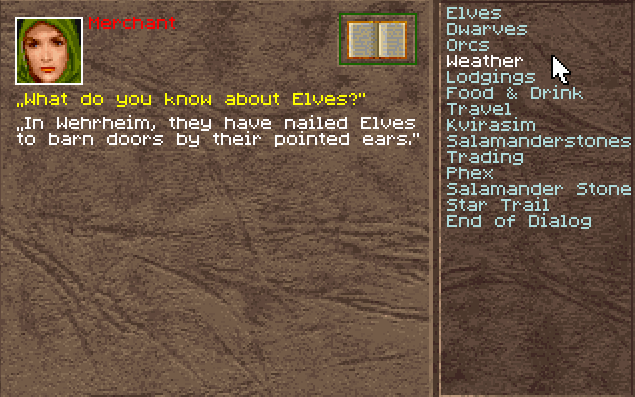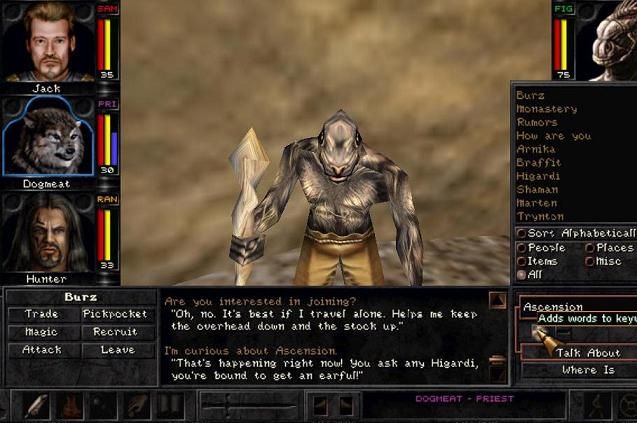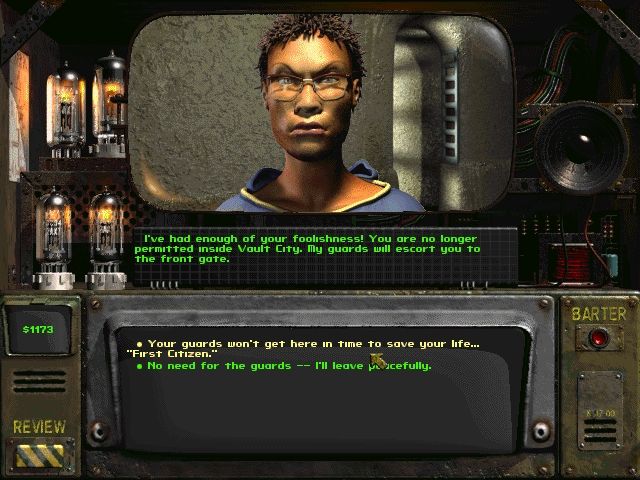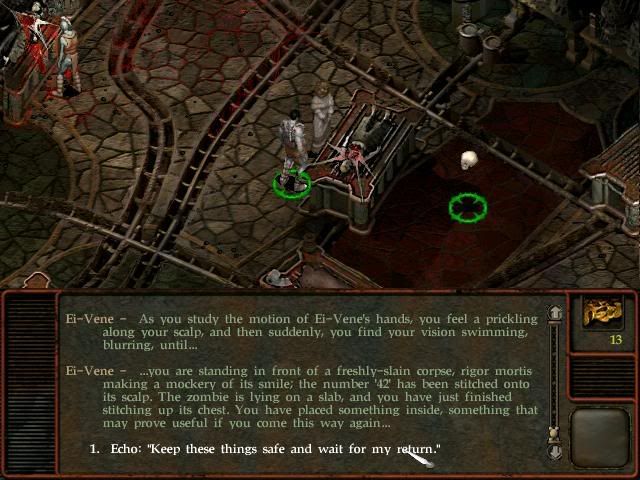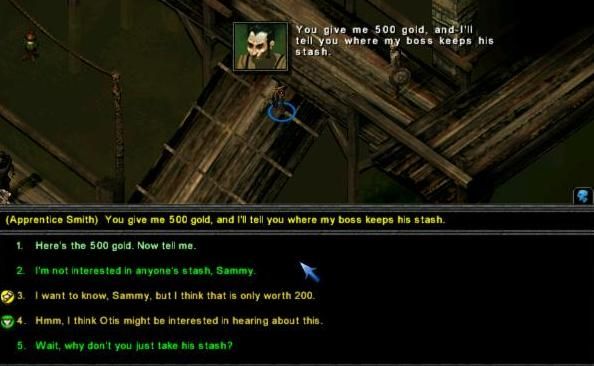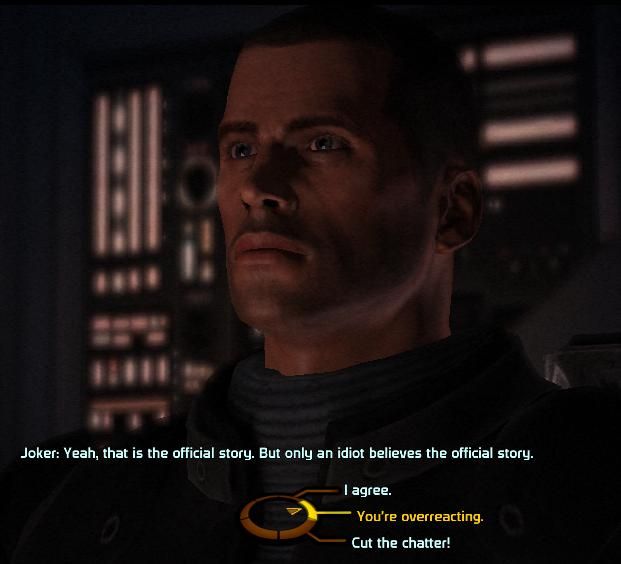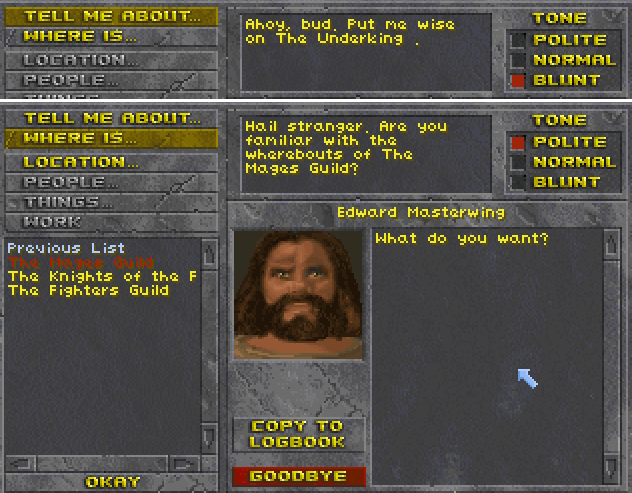One day I decided to write an article about RPG dialogue systems. I showed it to Gareth Fouche, the talented Scars of War developer, who immediately canceled his dinner plans and started throwing ideas around, tweaking, editing, and rewriting. Without further ado, I present you with our joint effort to explore the dialogue subject.
* * * In the beginning there was The Premise. And the Premise was good, because it said unto gamers "Lo! There is this bad guy over there! Verily, thou shouldst go to his castle, slaughter him and his staff and take anything that isn't nailed down!". And gamers did rejoice muchly, for they were rather fond of killing and looting.
But, over time, some gamers did begin to feel dissatisfaction. For, as enjoyable as slaughter and mayhem was, it lacked something. Something vital. A pat on the head. A "Good job, laddy". A gold star for effort. What use, the touchdown, without the crowd to roar its approval?
So the gods of game design put their heads together and came up with a plan. Games would now have stories, they declared. The story of the Chosen One, who was chosen to slaughter his way through the game world under the guidance of a host of simpleminded back-patting NPCs, characters who would constantly praise and congratulate the player for the simplest of tasks. To bring this wondrous plan to life would require new techniques, new methods for communication. Something more complex than the simple grunts and screams of the slain.
And gamers did rejoice again, for much ego stroking ensued. Now one couldn't walk 5 minutes through an RPG without stumbling across Bob the Peasant, whose favourite hat had been stolen by 15 heavily armed thugs, or a lazy blacksmith in need of someone to go across the street and fetch him a drink. And every time the player completed these mini-plots they would be rewarded, both with glowing praise and powerful equipment. A veritable kings ransom of mithril platemail, flaming swords and potent, lightning-wreathed staves; rewards suitable for the Brave Hero Who Went Across The Road And Fetched Back A Meat Pie.
But again there arose a problem. For now that characters in the world could speak to the player, the player expected to be able to talk back to them. As game worlds had become ever more expansive, important questions had arisen. Questions such as "Which way to the weapon shop, I need to sell all these spare swords I found lying around.", "Have you seen 15 large men and a hat anywhere around here?" and "Which way to the bad guy's super-secret fortress?" These were the burning questions that players desired to ask, but the simple "Please fetch my cat from the tree: Yes/No" lively banter of the time didn't support such deep conversation. So, taking a page from the adventure game genre, which at the time was still alive and kicking instead of a comatose husk, RPG designers introduced the concept of asking NPCs for information on Keywords. Now the player could collect Keywords just as they collected shiny baubles, and ask the characters they met about them.
Wehrheim sounds like a very progressive place. I should definitely visit it.
Wizardry 8 stands as perhaps the pinnacle of this type of design, combining several intuitive interfaces allowing you to truly *interact* with NPCs. Typing in a keyword or simply clicking on any word in an NPC's lines adds it to the communication "where is / talk about" interface and allows you to discuss this subject with NPCs. If you think this topic is important, you can easily add this word to the keywords list. You can remove and sort your keywords, avoiding the mess of earlier systems.
The "action" interface gives you the option to threaten or be nice, to attack, trade, pickpocket, recruit, or use magic such as charms or mind reading on NPCs. The palette of choices open to the player was vast. However, this breadth comes at the expense of depth of discourse.
"You there! Simple farmer type! Tell me everything you know about hats! What? You don't know anything about that topic? Playing coy, eh? Well let's see how coy you are with a sword up your arse!"
The example above shows the weakness of the Keyword system. As powerful a tool as it is for allowing players to probe for information, it is poor at conveying shades of subtle meaning in the player's interactions. Was the farmer merely clueless about the nature of head wear in general? Or were his motives more sinister? Was he part of a secret hat-worshiping cult, one which had taken Bob's hat so as to worship it in their secret underground shrine to all things head-covering? A single word struggles to convey the extra meaning and context of an entire sentence, no matter how threateningly you say the word "hat".
This desire for more complex shades of meaning resulted in dialogue trees, trees whose delicious textual fruits would serve as the mainstay of RPG gamer diets for over a decade, through to the modern era. Attempting to imitate natural conversation flow, dialogue trees offer the same back and forth discourse one would expect from another human being. The power of strong writing to convey tone and subtlety opened doors for whole ranges of previously impossible or infeasible interaction with characters. Combined with scripting, skill checks, and text adventure elements this system offers incredible flexibility for a cheap price, the cost of a few written lines. Perhaps no finer example of such power and flexibility exists than Planescape: Torment. Here is an RPG whose deep dialogues enable the player to do more than simply talk to characters, they can interact with them through the medium of text. The dialogue became an adventure, a game, in and of itself. Nestled within it were puzzles, scripted events, even character development. Want to break someone's neck? Cut some stitches on a zombie and see what's inside? Catch a thief when he's picking your pocket? Replace your eyeball with an eye you found in a jar? Tinker with your equipment? All these were achievable thanks to dialogue trees and skilled writing.
Not only can dialogue trees contain new gameplay, they can frame existing gameplay in an entirely new manner. The alternative dialogues for stupid characters in Fallout or Arcanum, the insane wit of the Malkavian Clan in Vampire: Bloodlines, both cast the gameplay and character interactions in their respective games in entirely new light. So much so that they can make two playthroughs of the same game seem entirely different, greatly enhancing role-playing and replayability.
However, while dialogue trees are potent tools, their strengths are also their weaknesses. Each line of text can convey a highly specific meaning, but the player is limited to only those meanings. It's impossible to think of and write about every possible response, reflecting every possible skill, background, emotion and tone for every response. No more could a player "ask NPC about X". The design had shifted the initiative from the player to the designer. As long as one stayed within the boundaries of the dialogue as written by the designer, everything was groovy. But those boundaries are tightly defined, impossible to break.
This system also places huge strain on a designer, for he has to cater for as many possible player reactions as possible. Torment offered tremendous depth to the player, but the cost was nearly half a dozen full novels worth of written text. A labor of love, but strenuous labor nonetheless. And in the hands of the less talented, those boundaries becomes straight-jackets, tying the player to awful, poorly written prose, causing them to long for the days when they could simply ask "Where is [hat]?" As powerful as dialogue trees are, they represent a dead end, or rather an area of ever decreasing gain in return for ever increasing effort. As with artwork and pretty graphics, increasing the amount of content requires exponentially increasing amounts of writing labor. With finite timelines and finite resources, writers are forced to cater for a few broad options which they hope can satisfy the most common options players might select.
Despite this fact, some of the greatest role playing games of our times have relied on dialogue trees as one of their pillars of gameplay. Fallout, Planescape: Torment, Baldur's Gate and Knight of the Old Republic games, Arcanum, Bloodlines, Mask of the Betrayer, all these titles rely on dialogue trees to shape the experience.
Aware of this limitation, designers have attempted to return some of the initiative to players via Combined-type dialogue systems but the results are generally poor. These systems are simply attempts to put multiple dialogue techniques into the game. Some games have attempted to combine the power of dialogue trees with the ability for the player to ask questions via a Keyword system. While this can work, partially, there tends to be a strong sense of disconnection. The contrast between the more realistic flowing dialogue trees and the simpler Keyword responses tend to jar the player a bit. Additionally, one system tends to end up overpowering the other. Although there have been a few experiments in this direction most have them haven't been hugely successful in combining the strengths of two or more systems. How many people actually even remember that Fallout had a keyword system as well as the dialogue trees? And, after the 5th time of clicking on "Rumors" in Oblivion, the novelty of hearing that the Fighters Guild is recruiting wears off.
While combined systems have, seemingly, failed to make a lasting impression, there have been experiments in other ways to solve the problem of introducing dynamism to conversation without re-introducing the issues of keywords. Taking a page from more casual games, like the Sims, some designers have tried experimenting with symbolic communication. In games such as the Sims, you don't choose specific dialogue. You choose tones and actions. Since these are simple, symbolic concepts like "laugh", "insult" and "shun" instead of true language, it is easier for the designer to build rules for interactions which can be combined by players into more complex interactions than dialogue trees.
However, the introduction of such systems into RPGs has been somewhat stillborn. Symbolic interactions lack the deeper meaning and subtlety of dialogue trees, re-introducing the weakness of Keywords, the weakness that dialogue trees were adopted in order to circumvent. In Fable you may have been able to perform a set series of symbolic actions on NPCs but each of these lacked the emotional weight of true speech. Especially when compared to the spoken speech in the actual dialogue, these actions seem superficial, weak. The system of variable manipulation behind it stands out in stark contrast, such as the persuasion mini-game in Oblivion. While a skilled writer could write a plausible dialogue that took the character through an emotional roller coaster of flattery, boasting, jests and intimidating comments, to sit and select each in turn from a menu gui robs the concept of any credulity.
Some have attempted, once again, to create a combination system. Dialogue trees, but ones which allow you to choose the tone with which you deliver the response. Bard's Tale, with its Snarky or Nice options, Mass Effect with its persuasion wheel and the upcoming Alpha Protocol which offers you a choice of professional/suave/aggressive secret agent archetype. The problem with such systems is that, being built on dialogue trees, they offer little extra flexibility in the best case, and in the worse actually surprise the player with a response completely outside their expectations. Sure, you selected the "insulting tone" option. But you never intended to whip out you pistol, push it to his head and instigate a bar fight. The problem is, like Keywords, Tones and Actions are very broad categories. A lot could be considered to fit within the category "insulting tone". However, unlike Keywords, since Dialogue Trees with Tones are still really just dialogue trees, they don't actually offer the added flexibility of a pure symbolic system such as the sims. You can't get dynamic conversations out of such a system. Taken with the fact that they can result in the player being surprised by what his or her own character says or does, a jarring state which goes counter to engendering a sense of "taking on a role", hybrid systems like this really don't seem worth it, unless your goal is to simplify and streamline for audiences who don't like to read, or save space on TV screens that could be better used for cool camera angles and more bloom.
A better option for the tone system is in combination with the Keyword system. Instead of just asking about a topic and getting a response, you can ask about that keyword in a certain tone. This, based on the NPC's opinion of you, your manner of speech, and the topic, could result in different responses. Daggerfall, with its attempts at dynamically generated conversations, tried this method, although they didn't exploit its full potential. In fact, Daggerfall's generated dialogue represents perhaps the best chance for advancing the state of RPG dialogue systems. Combining generated dialogue with carefully written text, in the same way that the Diablo games combine randomly generated environments with set pieces, could result in the holy grail of dialogue systems, one which allows the player to express themselves in a powerful manner while still allowing the designer the ability to carefully convey subtle meaning.
* * * While I'm very fond of full dialogue trees, I believe that the keyword system is the foundation of any evolution of RPG dialogue systems. I would certainly be interested to pick up where Sir Tech left off and see what could be done with this concept. The "tone" interface could be easily tied to speech skills and an Arcanum-like disposition system. Same goes for the action interface. Skills like backstab or critical strike can be easily tied to attack options, replacing our "critical strike" dialogue lines. I'd probably add "Small Talk" to get the local info.
For example, currently we have:
You strike up a conversation with the Daratan guards watching the gate. There isn't a lot of traffic these days, so the guards are bored and take full advantage of the opportunity to talk your ear off. You fake genuine interest and skilfully encourage the guards to impress you with their vast knowledge of current affairs, learning that the guards' pay has been cut again, that Flavius, the watch commander, has lost more than he can afford in a game of chance, and that the Imperial Guards are pretentious bastards who think that they are above the law just because they have some kind of fancy mandate.
1. "So, did Flavius pay his debt?"
2. "I can't believe that the guards who risk their lives to protect us all are underpaid! This is the real crime!"
3. "What do the Imperial Guards do anyway?"
With the keywords system, you'd simply explore topics like "Flavius' debt" or "underpaid guards", getting the info you need and then drawing your own conclusions and attempting to bribe the guards. "Bribe" action would allow you to choose an amount and would be tied to a corresponding skill (trading, etiquette, streetwise, whatever). That would probably be more exciting and interesting than picking a line from the list. The outcome would depend on the amount and your skill. Perhaps, a small fortune would be enough to overlook your clumsy attempt, while a more skilled character would be able to convince the guards to accept a modest amount. It's definitely a direction we'd like to explore one day.
|










